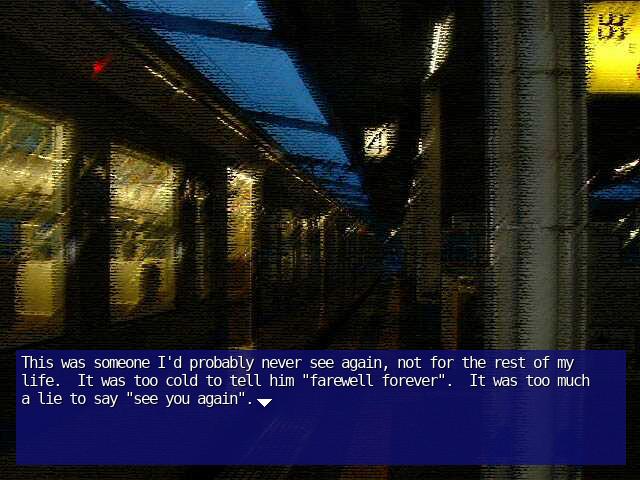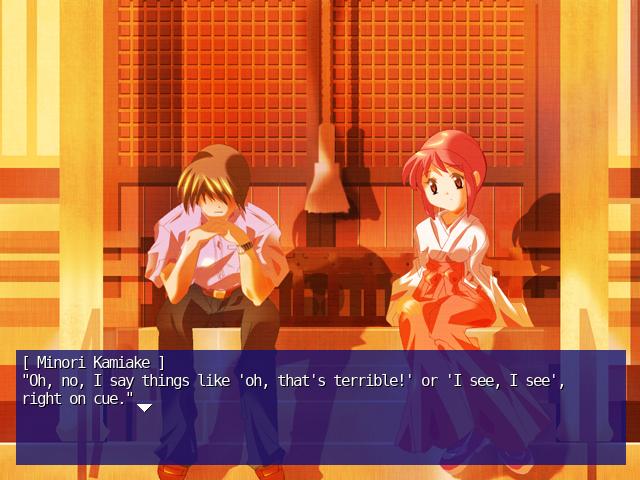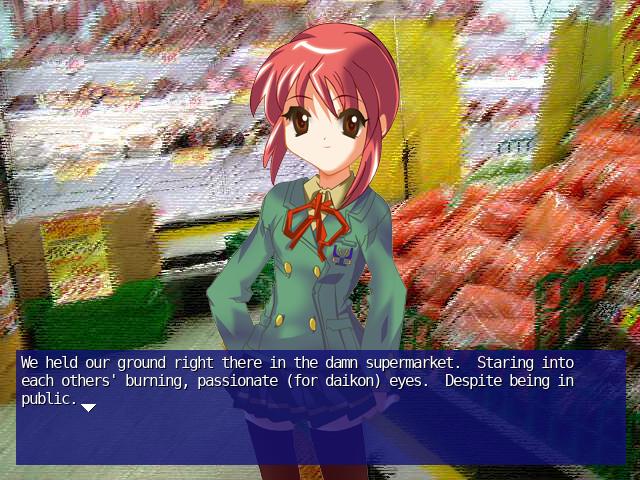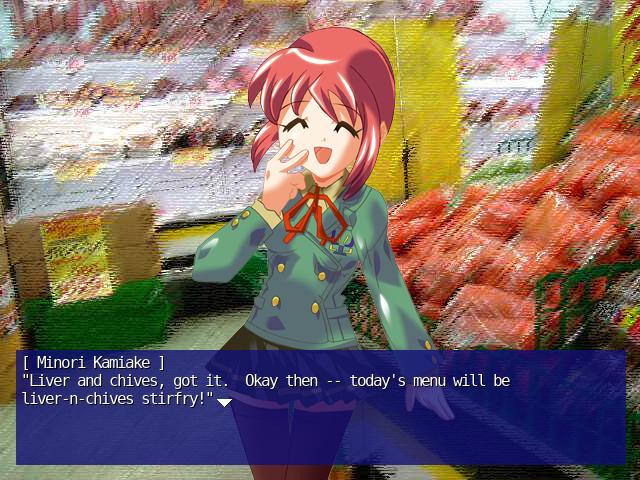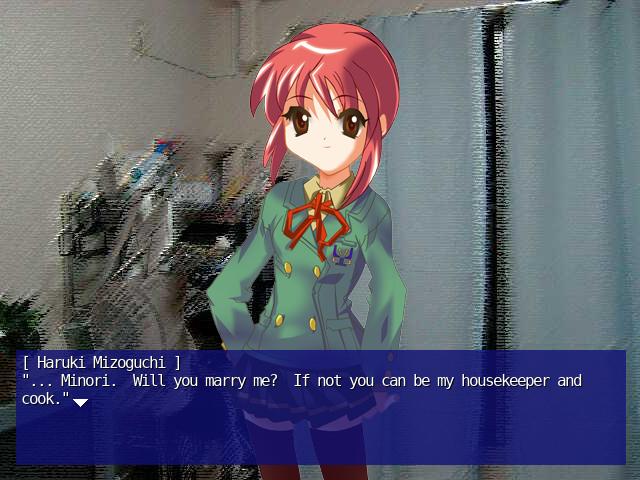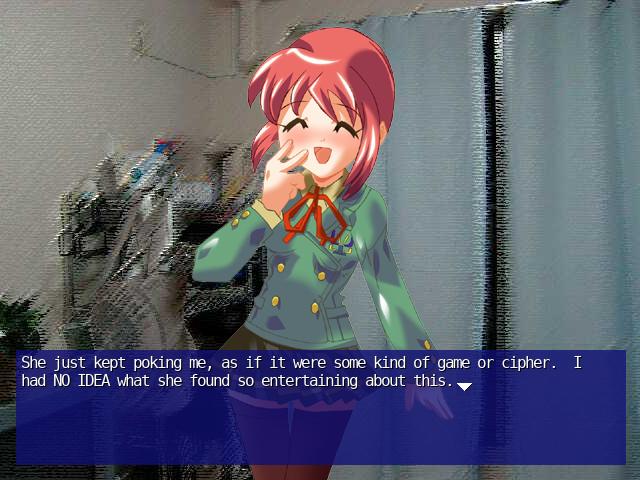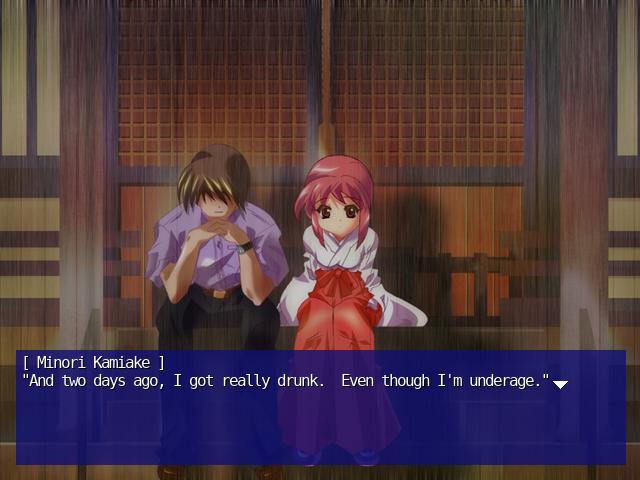This is part two of my four part series analyzing May Sky, the 2008 official English language localization of an impressive 2005 freeware Japanese visual novel called Gogatsu no Sora. This article covers the in-game period of May 14-21. Everything in this article presupposes that you have read part 1 of my project and, ideally, my spoiler-free review of May Sky (I recommend starting with the review if you are not familiar with May Sky).
With that brief introduction out of the way, I pick up where I left off in part 1 of my 4-part analysis.
Note on Quotes
There are no itallics in May Sky. For ensuring clarity, I am using itallics in quoation blocks when the block includes a character’s (always Haruki’s in this analysis piece) internal monologue. I am doing this to distinguish the internal monologue quotes from spoken quotes.
May 14
The novel implicitly suggests that Haruki regularly visited the shrine throughout May, but the story skips ahead from May 8 to May 14, leaving us with the impression that nothing particularly out of the established ordinary had happened between Haruki and Minori in the interim.
On May 14, an event occurs which causes a shift in the story, but instead of it coming in a conversation between Haruki and Minori, it is revealed during Haruki’s final meeting with an unnamed (now-former) co-worker with whom, he reports, he had become friends with:
The man sitting opposite of me – he and I had a lot in common. We were both 22; we’d both just graduated from college; we’d both just been employed in the same company; we sat in neighboring cubicles.
Haruki’s friend informed Haruki that he had decided to quit working for the company. The friend cited several reasons:
- “[A]ll the stuff we’ve done is neat, but … I’ve never once felt anything resembling excitement about it.”
- “I guess I’m scared now. Staying on with this company, coming here every day for the next forty years … I can’t see that at all.”
- “It’s not like I have some big dreams, some ideal that makes me go ‘no matter what, I am going to live for this’. I am empty.”
- “To put it bluntly, even if I were to find another job I don’t think it would turn out any better.”
- “I really screwed up.” (Referring to leaving.)
- “[M]aybe I’m just running away with my tail between my legs. You know what’s funny. Throughout high school, college – I thought I knew how this story ended. Now, suddenly, I realize I don’t – and I’m scared.”
Before Haruki’s former colleague left, Haruki asked him why he was leaving if he believed it was objectively a mistake. Haruki’s former colleague responded: “Because I can still do something about it,” with “it” being the feeling that staying with the company would mean that he would be sitting at the same desk for the next 40 years. The significance of the exchange has little to do with Haruki’s former colleague, who never returns to the story. Instead, the significance is what that conversation caused Haruki to feel:
The freshman blues I’d carried around with me like some vague weight … now started to coalesce – into a mass of suffocating anxiety. All the doubts and questions I’d had about stepping into the brave new world of adulthood were now being given shape. I didn’t like the shape they formed. I couldn’t point to a single thing that I was facing and say, ‘this is what’s bothering me’. And yet, in spite of that, yesterday’s restless, unsettled feeling was turning me inside out.
Haruki Mizoguchi
Haruki’s former colleague had not only verbalized what Haruki himself was feeling, but he had also shocked Haruki by taking drastic action. Worse yet, Haruki had already noted that the former colleague was the one friend he had made since starting his new job a month and a half earlier (notwithstanding the fact that Haruki considered his friend too insignificant to name, of course).
Haruki stated that while he assumed he would never see his unnamed former colleague again, he thought it would be “too cold to tell him ‘farewell forever'” but also “too much of a lie to say ‘see you again.'” I will not reference this line again in this analysis article, but I recommend keeping it in mind when you read the next part of my May Sky analysis series.
Who would he turn to with all of his “suffocating anxiety”?
May 15
A 16year-old shrine maiden on May 15, of course.
Narrator Haruki admits with hindsight that he had a feeling dumping his anxiety on Minori would be a bad idea.
I hoped – a little bit – that Minori wouldn’t be there, even though I knew that chances were she’d be there alright.
Haruki Mizoguchi
Minori was there, alright. Haruki proceeded to dump his problems on Minori – going through a sort of Hamlet to quit or not to quit routine about his job. It was received about as well as one might expect. Haruki says that he does not have the guts to quit, to which Minori responds “then just don’t quit silly.” But then he says that he feels like it is his last chance to do something, to which Minori responds “then just quit silly!” So on and so forth. Eventually, Haruki lashed out in frustration:
… Minori. Is my CRISIS, or what I’m going to have for dinner tonight, a more important question?
Haruki Mizoguchi
Minori replied “dinner” without a moment’s hesitation. That only made Haruki more agitated.
Minori. When you’re listening to your other friends tell their troubles, are you this nasty?
Haruki Mizoguchi
Minori replied:
Oh, no. I say things like ‘oh, that’s terrible!’ or ‘I see, I see’, right on cue.
Minori Kamiake
Haruki then asked whether Minori’s being dismissive of his “crisis” was because she hated him more than her friends. Minori denied that, stating instead “I just don’t care.” Haruki, being self-centered, missed the hidden significance of what Minori said. Minori’s point was not that she cared more about her friends problems, it was that she did the bare minimum with them to keep up appearances while being just as dismissive of her friends as she was of Haruki. But with Haruki, she felt comfortable expressing herself without pretenses (or at least without obvious pretenses). After Haruki poked Minori when she yawned and Minori responded by chopping Haruki on the head, Minori relented to a point and said something more substantive.
Hmm … you know, sometimes you turn into a stupid little kid.
Minori Kamiake
Haruki responded snidely, saying he was a teenager at heart. Minori told him to grow up. At this point, Haruki admitted to himself that Minori had a point:
So here we had this actual teenager (her) telling this teenager-at-heart (me) to ‘grow up already’ … Anyhow, after what I’d done, it was too late to back out gracefully. Had to play it to the end.
Haruki Mizoguchi
Haruki needed to keep up his appearances. Right on cue, Haruki continued his back and forth with Minori, ultimately getting whacked on the head again. Minori, in some frustration, finally exclaimed:
This has to be some BAD JOKE. Do you SERIOUSLY expect me to sit here and counsel you?
Minori Kamiake
Haruki responded in the affirmative, which caused Minori to get up and try to leave. Haruki, who was admittedly behaving like a bratty little kid but still desperate to have someone listen to him, tried to play it off as a joke and indirectly apologized for his behavior. But the back and forth continued. Haruki admitted to himself that his behavior was off:
Whoever heard of going to a teenager girl for advice on being an employed adult? Exactly. No one.
Haruki Mizoguchi
Minori twisted the knife after Haruki narrated the above sentiment:
First of all, why are you bringing your troubles to someone like me anyway? Is it because you don’t actually have any friends?
Minori Kamiake
Minori hit the nail on the head, although Haruki tried to deny it unconvincingly. Now I am going to combine Minori’s next two lines, omitting a couple of unsubstantive interjections by Haruki and parts of Minori’s responses to those interjections:
I really don’t like talking with people about what’s bothering them. I suck at it, and it’s SUCH a waste of time anyway … [Your former co-worker’s] problems are his own; they have NOTHING to do with me. He should just do as he pleases, if you ask me … Like I said, the choices that someone else makes is that someone else’s responsibility.
Minori Kamiake
While one cannot fault Minori for dismissing Haruki’s life problems under these particular circumstances, we should file away her assertion that no one else’s problems have anything to do with her and that people should always “do as [they] please.” Haruki then asked Minori whether she was saying she did not care whether he quit his job. Minori then stated the obvious:
Yep. If you wanna quit, then why not go ahead and do that? Even the unemployed are still people, and they’re still alive, aren’t they?
Minori Kamiake
After that, Haruki’s and Minori’s banter became somewhat more lighthearted, with Haruki joking that he would live at the shrine if he became unemployed, causing Minori to jokingly beg him to not quit his job. Eventually, Haruki threw up his arms and said he did not care anymore, which inspired a turnabout from Minori:
Oh, excellent! If you really don’t care, then you might as well spit it out, right? As long as you don’t turn into a mental case on me, I’d be happy to listen to your foolishness.
Minori Kamiake
While Haruki was stung by Minori chalking up his problems to foolishness, he took her up on her invitation and Minori nodded along – although he suspected that she was not really listening. Narrator Haruki summed up their relationship at the moment as “[m]ore than strangers, less than friends, each pursuing our own ends.”
Haruki as narrator and Minori in the moment more or less summarized all of the ways in which Haruki’s behavior was childish. The only minor mitigating note for Haruki is that his behavior was not driven by the idea that Minori somehow owed him for his listening to her gripe about her day on multiple occasions or buying her food. The evidence in the script clearly points to Haruki being lonely and needy and concluding, unwisely, that his best course of action was to whine at Minori.
While Minori was in the right with respect to her specific complaints about Haruki’s behavior, the script demands that we take a critical look at her reasoning. It may be the case that while Minori was on sound footing regarding Haruki in this specific instance, her reasoning would leave her on less solid footing in other cases. Why was Minori so frustrated with Haruki? An outsider can rightfully criticize Haruki for seeking counseling from a 16-year old girl. But Minori’s complaint was not specifically that an adult was asking a teenager for life advice. Minori’s complaint, as she explicitly stated, was that she felt as if Haruki was trying to offload responsibility for his own life choices onto her. Minori’s position is that the only person who can decide whether Haruki should stay at his job is Haruki – and it is Haruki, and no one else, who has to then deal with the consequences of that decision. If we recall earlier cases when Minori griped to Haruki, she did so because she wanted to chat, have someone listen, and get some things that were bothering her off her chest. At no point did Minori ask Haruki for advice. This is why after their comical and sometimes tense exchanges broke Haruki’s will, she invited him to talk about his problems provided he did not “turn into a mental case.” That is, Minori was willing to listen – but no more. After calling Haruki’s “crisis” foolish, Minori then made it clear she would expect no more from him:
Next time, when I’ve got something stupid to complain about, you’d better lend a sympathetic ear, understand?
Minori Kamiake
The issue as I see it is whether Minori’s position is sustainable in all cases – for example in more normal friendships with classmates or other people similarly situated to her. File away for the time being Minori’s stating that an additional reason she does not enjoy “counseling” is because, in her own estimation, she is not good at it. We must consider whether part of the reason Minori is standoffish with regard to giving advice is because she thinks it will end poorly. Moreover, we must consider whether Minori’s view on only venting to others but never asking for help is a way of maintaining internal consistency in light of her unwillingness to do anything more for others. Finally, Minori never seems to consider that one can offer support while still framing that support in a way that encourages the other person to take responsibility for his or her choices.
May 18
In the end, Haruki and Minori navigated through their silly argument and returned to the status quo. May Sky then skips ahead to May 18 – which is clearly and beyond doubt the strangest part of the novel. The chapter picks up not at the shrine, but at the grocery store. Haruki reaches for a daikon radish on sale only to find that someone else had her hand on it. That someone was Minori – now wearing her school blazer. If one thought that their argument on May 15 was immature, it had nothing in terms of immaturity or passion on their fight over a root vegetable. As funny as this sequence is – the daikon fight itself, which occupies several pages of my PDF version of the script, is not significant to our analysis beyond noting that they both behaved like children.
What is significant is Minori’s proposition.
After Minori and Haruki decided to split the daikon, Minori told Haruki that her parents were out of town and asked what would be a fateful question.
Is there any chance of you treating me to dinner?
Minori Kamiake
Haruki initially refused, internally citing her selfishness and perhaps also thinking about his limited finances. Minori was not deterred – offering to cook dinner if he bought the ingredients. Haruki gave in, not having had a home-cooked meal in a long while. Haruki did manage to avoid buying Minori expensive tuna cuts, although he promised that he would buy some for her after receiving his first paycheck after somehow convincing himself that Minori, whose Aunt ran a shrine and whose Mom had enough leisure time to write over 200 piano pieces, was from a poor family. The rest of the shopping trip went about as well as one would expect for Haruki:
Her power of persuasion in convincing me that she was up to any decent purpose? About as poor as I’d mistaken her wallet to be. I was left holding the other handle of the bag. Oh, and as for its contents? Lots of foods that (1) Minori liked and (2) I hated.
Haruki Mizoguchi
Minori confirmed that she had deliberately chosen foods that Haruki said he hated, and Haruki described her as smiling more brightly than she ever had before when she said it.
We will skip over Haruki’s and Minori’s banter while she was cooking because it was more comedic than revealing about their characters.
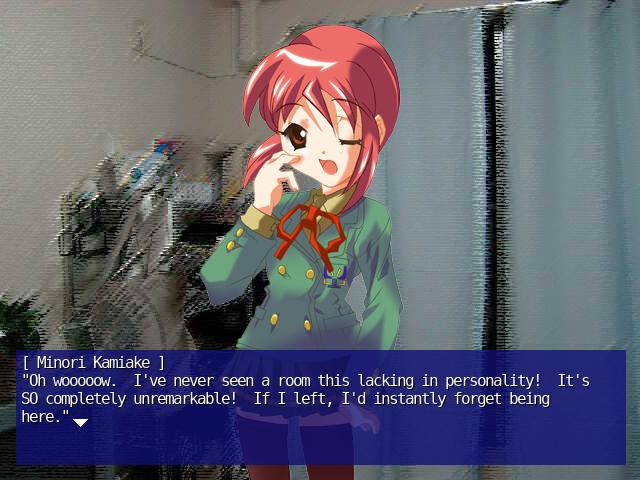
Minori proved to be a good cook, and Haruki was very grateful for her cooking, so much so that he had a proposal:
… Minori. Will you marry me? If not you can be my housekeeper and cook.
Haruki Mizoguchi
Minori immediately rejected the proposal, stating she would not throw away her life for his stomach. Haruki chided Minori for making light of his “once-in-a-lifetime proposal,” to which Minori, on cue, advised him to not make such important proposals lightly. We should file this humorous banter away for much later (specifically the fourth and final part of this series).
There was of course one part of the dinner that Haruki did not approve of – the entree, liver and chives, featured the two foods Haruki hated most of all. All was well until Minori force-fed Haruki a chopstick-full of liver and chives (perhaps it was revenge for the rice cake 13 days prior – but Minori does not specifically reference that incident).
After Haruki took a shower, Minori asked him if she could have a beer from his fridge. Haruki absent-mindedly said yes, apparently (according to him) forgetting her age (Japan’s drinking age was and is 20 – so that was a big miss). Three beers later, Minori was drunk. While this would seem like an opportunity for something dramatic to happen, Minori mostly acted like an exaggerated version of herself, poking Haruki in the face to the point she caused bruising before passing out on him.
The inherently unsavory nature of the situation dawned on Haruki, but he was able to carry her from his apartment to the shrine without further incident. Minori woke up mid-route having regained her senses, although she remembered enough to have a distinct feeling that she had made a fool of herself.
While the dinner arc had plenty of comedy, it did not paint the most flattering portrait of either Haruki or Minori.
The questionable circumstances of May 18 stemmed from Haruki’s inability to say no to Minori. He could not turn down her request to visit and he also could not put his foot down when she used his money to buy several food items that he hated. Similarly, he absent-mindedly approved her request for a beer from his fridge (while it seems somewhat implausible that one would forget Minori was well-short of 20 years old, especially in light of the fact she was in her school uniform – that is the clear position of the script so we will have to accept it for our analysis) – which is consistent with the growing list of examples of Haruki always saying yes to Minori – even when he should not.
While there is no indication in the story that Haruki had nefarious intentions (outside of a few “I’m a man after all” thoughts in his monologues), Minori could charitably be described as naive for inviting herself over to the apartment of a 22-year old man at night whom she still does not know very well. Moreover, in light of the fact that Haruki agreed to have her over and to buy all of the food that she would be cooking for dinner – one could question her determination to (1) try to get him to buy expensive tuna and (2) compensate by buying food he did not like. Finally, having already noted that it was probably unwise of Minori to invite herself over to an adult man’s house in the way she did, it was even more unwise to get drunk there. Granting all of Haruki’s flaws, Minori should count herself as fortunate she did not attach herself to a man with character defects worse than immaturity, indecisiveness, and being a mush when it came to her demands.
Haruki’s decision-making and being a mush for Minori are not cryptic. But what exactly was Minori thinking? I mark Minori’s behavior up to the escalation of tendencies we saw in her earlier shrine meetings with Haruki. Minori, like Haruki, is lonely – and when she saw Haruki at the grocery store, she saw an opportunity to put off retiring to an empty house. Minori also likes attention, but she is immature in how she seeks attention. For example, one could see her trying to drain Haruki’s wallet and force him to pay for a main dish consisting of two things he hated as a way of testing the limits of how much she could get away with. If we understand Minori as testing Haruki’s limits, the beer request makes sense too. If he was willing to buy all this food and promise to buy her more expensive food later, perhaps he would not stop her from having her first alcoholic beverage (or beverages as it would turn out).
May 21
Haruki visited the shrine on Saturday, May 21. It was raining heavily on this occasion. Haruki genuinely did not expect to find Minori there, but to his surprise, she was there in full shrine maiden attire sitting under a canopy on the front steps. Minori greeted him with her traditional quip about him being bored – for once, Haruki finally had a retort:
I guess that makes two of us today, doesn’t it?
Haruki Mizoguchi
Minori, apparently lacking her usual spunk, agreed with Haruki.
Minori and Haruki sat for a while in silence. Below, I will excerpt part of Haruki’s thoughts:
Even though we were side-by-side now, even though we knew that something had happened between us, we didn’t do anything about it. That was our stance. A waiting game: each waiting for the other to ask to be let in. Neither doing anything. In a sense, it may have been that we didn’t care about each other. But that wasn’t quite it – for this, too, was an odd kind of trust. An unbreakable trust that we would not meddle in each other’s lives, that we would not become part of each others’ lives.
Haruki Mizoguchi
After 20 minutes, Minori broke the silence after asking for permission to ask a question:
… you know that word ‘correct’? What does that really mean, anyway?
Minori Kamiake
Minori describes having gotten drunk at Haruki’s apartment despite being underage as they sit in the rain at Kamiake Shrine.
Minori continued:
… I think, probably, both you and I have always done the ‘correct’ thing up until now. Always …
Minori Kamiake
Haruki expressed some disagreement, thinking of himself rather than Minori, which led Minori to qualify her statement in an attempt at a quasi-Socratic/Platonic take:
To put it another way, we just don’t DO things that we think are ‘wrong’. If we felt something was ‘wrong’, we wouldn’t do it in the first place.
Minori Kamiake
Haruki retorted by confessing he teased a girl when he was a kid. Minori followed up with a reference to May 18:
And two days ago, I got really drunk. Even though I’m underage.
Minori Kamiake
But Minori insisted these actions were correct, at least under her definition:
[These decisions were correct] [t]o the people we were at those moments in time – absolutely those were the ‘correct’ courses of action.
Minori Kamiake
Minori then opined that she would “go to my grave thinking that ‘correct’ is within each individual person.”
Haruki was confused about what Minori was getting at – perhaps she was too.
As it would turn out, Minori had other concerns beyond the 18th. She asked Haruki if she could vent – without specifically referencing that she had extracted a promise from him on the 15th that he would listen to her silly problems in the same way she listened to his. I excerpt from her venting:
Just recently, I did something I think is ‘correct’, and then this girl in my class got REAL mad at me for it … How could it be, huh? I don’t think I did anything wrong. She doesn’t think she did anything wrong either. We both did what we felt was ‘correct’. So how come everything’s so messed up now?
Minori Kamiake
Minori assured Haruki she did not need an answer – and suggested she would just apologize even though she did not think she was wrong. But still – she was twisting herself into a pretzel trying to figure out who was the judge of who was right. Then, Minori thanked Haruki for listening. Haruki insisted he did nothing but listen, to which Minori responded:
As far as I’m concerned, right now, I couldn’t have asked for more, really.
Minori Kamiake
She continued when Haruki continued to insist he did not do anything worth being thanked for:
When someone just needs to get some load off their mind, especially if it’s all nonsense, being listened to like this is extremely important! Haven’t you ever really wanted someone to talk to, more than anything else in the world?
Minori Kamiake
Haruki did not disagree, but he told Minori it didn’t have to be him that she spoke to. Then, for perhaps the first time in some time, Minori surprised Haruki:
Nope. It HAD to be you. … I feel like I can talk to you about anything … even things I don’t tell my parents or friends. Everything …
Minori Kamiake
After a pause, Minori continued with another surprise (note I am piecing together three parts of what she said, separated by pauses):
… so I guess … when it comes to you, I … think there’s nothing between us. We both … how do I put this? We categorize the people we know, don’t we all? We label them as friends, family, relatives …
Minori Kamiake
Minori continued:
But I can’t fit you into any of those boxes. You don’t belong anywhere, it’s just me and you … I can say horrible things about my classmates to you, but they’ll never hear it.
Minori Kamiake
This turns out to be a significant passage. As presented in the novel, it looks like Minori is about to confess her feelings (the music pauses here) for Haruki before coming out with “there’s nothing between us.” A careful reader will see that Minori was not thinking of romance at all – she did not set up the line as a tease and she was not, consciously at least, trying to cover for romantic feelings. Minori, being an intelligent-but-guarded and very self-centered teenager, was inadvertently being a too cute by a half. She was seriously trying to convey that she was comfortable talking to Haruki because their relationship existed in a different sphere than her family and school relationships and that she could talk to him without worrying about the effect it could have on other parts of her life. Of course, while Haruki could be clear-headed about Minori in some cases, he admitted in his narration that he did not take this line from the girl who had helped him see the world differently too well – noting that he felt a sharp pain when Minori asserted there was nothing between them at all.
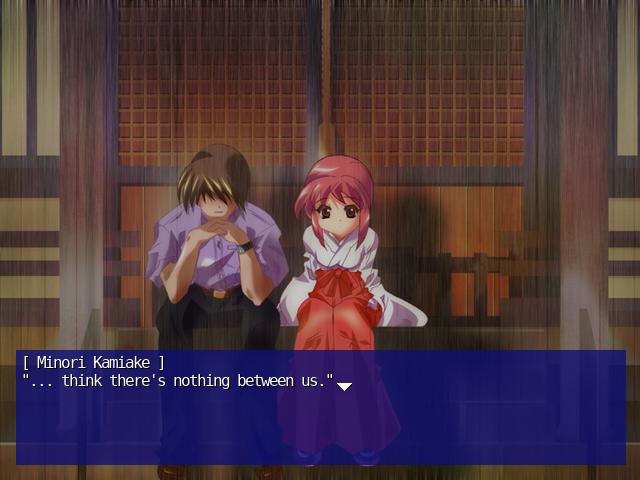
Haruki acknowledged in his narration that he had a similar thought about boxes when he confided in Minori about his career angst. But still, he subjectively understood Minori as saying she was comfortable with him because he did not matter to her. After Minori added that she could even tell Haruki embarrassing things, Haruki teased her by inviting her to do so – but Minori was serious, so Minori tried to steer the conversation back to the point, before Haruki finally derailed it with a joke about Minori being violent.
Now we have quite a bit to work with.
This is the first instance in the story when Minori speaks from the heart about her feelings on something other than nature – granting she makes a characteristically teenage effort to intellectualize those feelings. Other than greeting Haruki by asking if he was bored, Minori made no attempt to mess with or hit Haruki, which also distinguishes May 21 from their previous meetings.
What exactly was Minori going on about?
Minori’s fight with her friend is ambiguous – but in context we can infer what probably happened. To start, we can rule out that it had to do with her talking about what happened with Haruki from the fact that Minori makes a point of saying that she does not tell her friends embarrassing things. Minori was almost certainly describing an actual disagreement she had with one of her school friends, although the nature of the disagreement is was not something she opted to disclose. Recall that when Minori dismissed Haruki’s attempts to seek her counsel, she stated that when her friends have problems, she simply nods along to keep up appearances while otherwise blowing them off. I suspect Minori had reacted in a characteristically Minori way to one of her friend’s problems, and this had led to a fight similar to the one she had with Haruki on the 15th. Minori believes that her way of thinking and avoiding entanglements in the problems of others is correct, but similarly dislikes conflict or having people think poorly of her – causing her to conclude that she would likely apologize to keep up appearances while maintaining her own view that neither she nor her friend had anything to apologize for. Of course, it is Minori’s tendency to distance herself from others and maintain a veneer of superficiality that created the circumstances for Haruki to occupy a unique place in her life.
There is clearly something else bothering Minori: That is her feelings about Haruki. Minori’s correct spiel begins with her refernce to her drunkenness on the 18th, while her vague reference to the argument with her friend is presented only after that. Although Minori insists that her behavior was “correct” in both cases because it seemed right to her on the 18th, she is clearly embarrassed – evinced by how differently she behaves around Haruki on this day than before. Minori is many things. On one hand she is a talented pianist who can articulate her aesthetic views in such a way as to genuinely move a malaise-ridden office worker six years her senior. But this does not make Minori mature in all respects – she is still very much a 16-year old girl. Minori’s immaturity informs what is, on a very surface-level, her most level-headed interaction with Haruki to date. If we understand that Minori was in fact embarrassed about her behavior on the 18th – something Haruki of all people picked up on before Minori started talking, why was it that Minori, who was guarded to the point she ordinarily never asked for advice or divulged embarrassing things, was fine behaving in embarrassing ways in front of Haruki and telling him all the things that she otherwise kept to herself? Minori spent some time thinking about it and decided the answer was that Haruki just existed separate from the other people in her life, including friends. But Minori phrased it in the way she wanted to, without considering that Haruki may hear her saying that she did not care about him at all. This would not have been a problem had Minori intended for her words to be taken literally – but we will soon see that was not her intent.
Minori’s feelings about Haruki are shifting in ways she probably does not fully understand, but I do not think she was consciously thinking of him romantically at this stage – not least because there is little evidence that Minori thinks of herself at all as someone who a man would be attracted to. Instead, Minori had become dependent on Haruki in just two weeks. This lonely, closed-off, sentimental girl who spent her time off from school and her rainy days working alone, part-time at a shrine, suddenly had this fun 22-year old sweep into her life. He praised her music, listened to her vent, paid attention to her, and seemed completely unable to turn her down. Minori liked the attention, but Minori also liked that she could be herself, or at least behave without inhibition, and still have Haruki’s full attention. Of course, Minori, a girl with limited life experience and emotional range, missed that she was taking her new companion’s attention for granted.
Haruki offered the following monologue (excerpted):
I felt a tiny awareness coming to life within some deeply hidden crevice of my chest. There it flickered weakly, like a candle about to be blown out. In the end, I’d never been able to answer that question for myself: what was it that I wanted to do with my life, anyway? … But I did know one thing. Something new was coming into being inside me. Didn’t know what it was. That didn’t matter right now. And all the while, the piano went on singing its songs in a May sky choked with rain.
Haruki Mizoguchi
Regardless of whether Haruki’s feelings were clearly romantic on May 21, did have strong feelings for Minori. He credited Minori with making him see the pretty things around him and spending time with her was helping persevere through a very difficult patch in his life. Had Haruki had a more level head, he would have been able to see through Minori’s obfuscation in her saying there was nothing at all going on between them.
Before we move into the final section of the main part of the novel – I will lead with a question. Much of May Sky has focused on Haruki’s indecisiveness about his future. But what about Minori? What would it take for Minori to fully let her guard down and be honest about her feelings and desires? What would it take for Minori to extend a hand to someone or accept a hand being extended to her? Let us find out.
Part 2 Conclusion
Each of the three Haruki-Minori meetings covered in this analysis featured some sort of conflict or issue. In the first meeting, which occurred on the 15th, Haruki annoyed Minori by trying to use her as his life counselor. In the second meeting, which occurred on the 18th, both Haruki and Minori behaved somewhat unwisely, culminating with Minori embarrassing herself by getting drunk off three beers from Haruki’s fridge. The third meeting followed cleanly from the previous two. Minori’s embarrassment over her behavior at Haruki’s apartment made her introspective, and she called in her favor from their meeting on the 15th by having Haruki listen to her problems.
The events of the 15th, 18th, and 21st , as we see in the next part of this series, created problems that our strange friends will have to confront. Without fully equating Minori’s faults to Haruki’s on account of her younger age, Minori said several things on both the 15th and 21st that will prove to have some unintended consequences. I noted some clear flaws in Minori’s view of human relationships and Minori’s clunky, self-centered explanation of why Haruki had a unique place in her life on the 21st was not taken by Haruki as she had likely intended. Haruki is similarly self-centered with regard to Minori, and in his case his focus on his own feelings influenced how he understood those things Minori said on the 15th and 21st. Having granted that Minori does not think some of the things she says through as well as one would hope, she is not so mysterious that Haruki could not have had a better read on her had he taken a step back.
Perhaps all would be well and work itself out if things could continue on indefinitely as they were. But the month of May was approaching its end, and the winds of impending change were beginning to swirl.
This article is part of my collection of posts about May Sky, Insani's 2008 localization of a freeware Japanese visual novel called Gogatsu no Sora.
